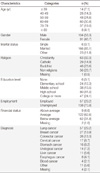Abstract
Purpose
The purpose of this study was to examine the actual condition and the general cognition toward the disclosure of diagnosis among cancer patients.
Methods
A survey using a structured questionnaire was conducted with 195 cancer patient from October 18, 2011 to November 19. The data was analyzed with SPSS (version 18.0) for frequency analysis and χ2 test.
Results
88.2% of cancer patients were agreed to the disclosure of cancer diagnosis. Cancer patients had preferences for a doctor to notify the disclosure of their cancer diagnosis (90.8%) and immediate notification of the cancer diagnosis (89.7%). The sequences of disclosing cancer diagnosis were following; the patient and the care-giver notified at the same time (47.2%). the patient notified first (32.3%) and the care-giver notified first (20.5%). Cognition toward disclosure of cancer diagnosis was statistically significant only with age (p=.003).
Conclusion
These result suggested that cancer patient wanted to notify their cancer diagnosis by doctor, as soon as cancer diagnosis confirmed, before notifying to their family, and to know accurate cancer related information. Therefore, principals and guidelines in disclosing cancer diagnosis are essential to increase the quality of cancer patient care.
Figures and Tables
References
1. National Cancer Information Center. Cancer facts figures 2012. Accessed January 2, 2012. http://www.cancer.go.kr.
2. Kawakami S, Arai G, Ueda K, Murai Y, Yokomichi H, Aoshima M, et al. Physician's attitudes towards disclosure of cancer diagnosis to elderly patients: a report from Tokyo, Japan. Arch Gerontol Geriatr. 2001; 33:29–36.

3. Ozdogan M, Samur M, Bozcuk HS, Coban E, Artac M, Savas B, et al. "Do not tell": what factors affect relatives' attitudes to honest disclosure of diagnosis to cancer patients? Support Care Cancer. 2004; 12:497–502.

4. Hu WY, Chiu TY, Chuang RB, Chen CY. Solving family-related barriers to truthfulness in cases of terminal cancer in Taiwan. A professional perspective. Cancer Nurs. 2002; 25:486–492.

5. Yun YH, Yoon EY, Park HA, Park TJ, Yoo TW, Huh BY, et al. Presentation of cancer diagnosis from the patient's point of view. J Korean Acad Fam Med. 1992; 13:790–799.
7. Rhee H. The attitude of medical students and residents toward the terminally ill. J Korean Neuropsychiatr Assoc. 1979; 18:49–54.
8. Hong YS. Telling to the diagnosis of cancer to terminal ill patients. J Korean Med Assoc. 2001; 44:963–968.

9. Kelly WD, Friesen SR. Do cancer patients want to be told? Surgery. 1950; 27:822–826.
10. Novack DH, Plumer R, Smith RL, Ochitill H, Morrow GR, Bennett JM. Changes in physicians' attitudes toward telling the cancer patient. JAMA. 1979; 241:897–900.

11. Park DK, Cho DY. Attitudes on in-patients toward telling truth to the dying patients. J Korean Neuropsychiatr Assoc. 1981; 20:339–348.
12. Jeon SA, Lee SE, Roh YK. Telling the diagnosis of cancer. J Korean Acad Fam Med. 1996; 17:445–453.
13. Park JN, Yang S, Choi SE, Choi KM, Hong YS, Lee KS. The disclosure of cancer diagnosis and its prognosis. Korean J Hosp Palliat Care. 2004; 7:169–178.
14. Han GR. A study on a notice of cancer diagnosis. [dissertation]. Seoul: Kyung Hee Univ.;2006.
15. Faul F, Erdfelder E, Buchner A, Lang AG. Statistical power analyses using G*Power 3.1: tests for correlation and regression analyses. Behav Res Methods. 2009; 41:1149–1160.

16. Yun YH, Lee CG, Kim SY, Lee SW, Heo DS, Kim JS, et al. The attitudes of cancer patients and their families toward the disclosure of terminal illness. J Clin Oncol. 2004; 22:307–314.

17. Noh HT. Truth telling to cancer patients. Korean J Obstet Gynecol. 1993; 36:63–74.
18. Kim HJ. Analysis of user's satisfaction for telephone cancer information service. [dissertation]. Seoul: Yeonsei Univ.;2006.
20. Luker KA, Beaver K, Leinster SJ, Owens RG, Degner LF, Sloan JA. The information needs of women newly diagnosed with breast cancer. J Adv Nurs. 1995; 22:134–141.

21. Deane KA, Degner LF. Information needs, uncertainty, and anxiety in women who had a breast biopsy with benign outcome. Cancer Nurs. 1998; 21:117–126.

22. Hur HK. Information needs of women with breast cancer. J Korean Acad Adult Nurs. 2000; 12:286–295.
23. Hari D, Mark Z, Bharati D, Khadka P. Patients' attitude towards concept of right to know. Kathmandu Univ Med J (KUMJ). 2007; 5:591–595.
24. Galloway S, Graydon J, Harrison D, Evans-Boyden B, Palmer-Wickham S, Burlein-Hall S, et al. Informational needs of women with a recent diagnosis of breast cancer: development and initial testing of a tool. J Adv Nurs. 1997; 25:1175–1183.

25. Ahn SH, Kim YS, Yoo MS, Bang KS. A patient's right to know and self-determination. Korean J Med Ethics. 2009; 12:153–164.

26. Peteet JR, Abrams HE, Ross DM, Stearns NM. Presenting a diagnosis of cancer : patients' views. J Fam Pract. 1991; 32:577–581.




 PDF
PDF ePub
ePub Citation
Citation Print
Print







 XML Download
XML Download